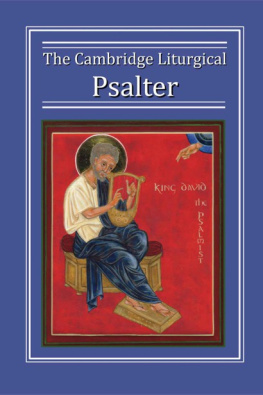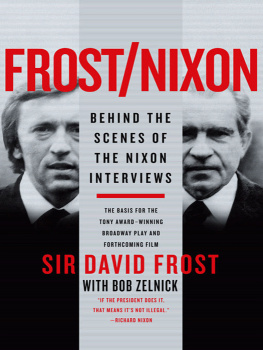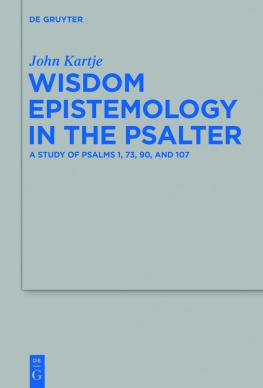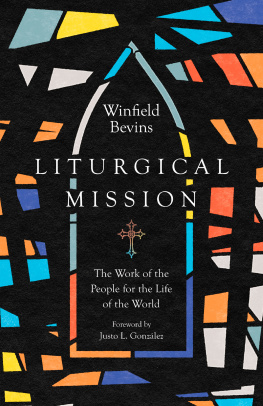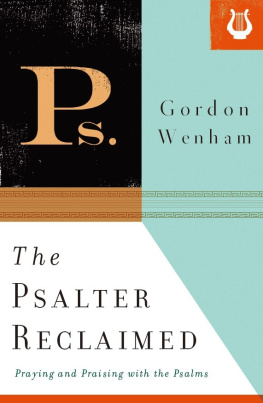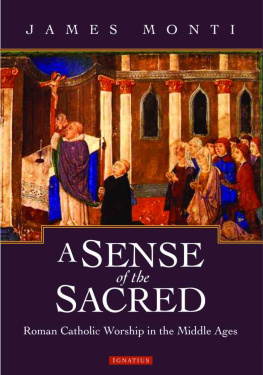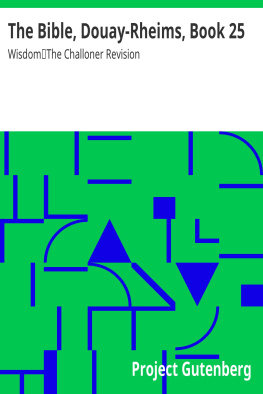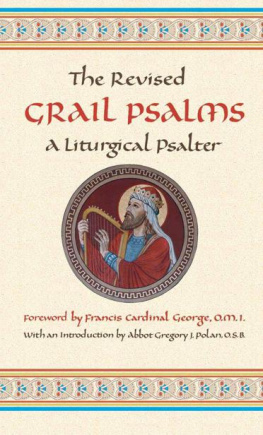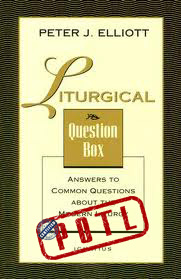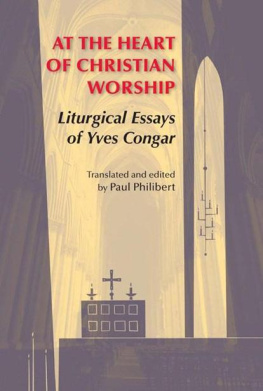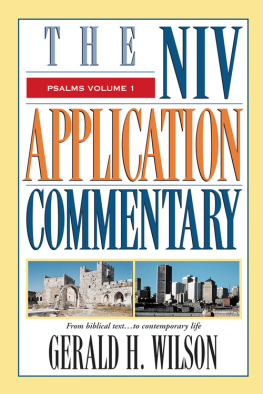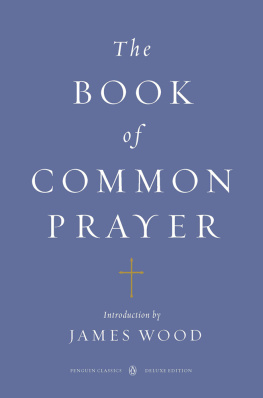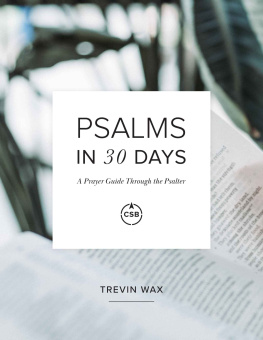King David thePsalmist by courtesy ofJuliet Venter Juliet Venter2010 www.juliet-icons.co.uk
THECAMBRIDGELITURGICALPSALTERfirstpublished asTHEPSALMS:A NEWTRANSLATION FOR WORSHIPAQUILA2012 PUBLISHING HISTORY
TheLiturgical Psalter was first published in 1977 as
ThePsalms: A New Translation for Worship by William Collins, in cooperationwith the Church Information Office. It was put out in two editions, one a plaintext (as here), one pointed for singing to Anglican chant. Thetext was excerpted in Church of England draft services before its publicationand was used in the text of
The Alternative Service Book 1980. As
TheLiturgical Psalter, the complete translation was bound up with mosteditions of
The Alternative Service Book 1980. Thetranslation was incorporated in
An Australian Prayer Book (1978), in
AlternativePrayer Book 1984 (Church of Ireland), and in
An Anglican Prayer Book(Church of the Province of South Africa). It has been reprinted in a variety ofpublications in England and abroad, adopted for use by the Uniting Church inAustralia and excerpted for the Methodist
Hymns and Psalms (1983).
Anadapted version was published by HarperCollins in 1995 as The Psalms: TheLiturgical Psalter (New Inclusive Language Version) and in this form wasincorporated into A Prayer Book for Australia (1995). In1996 The Liturgical Psalter was extensively excerpted in Donald Daviesedition for Penguin Classics, The Psalms in English, as one of twoversions representative of the twentieth century. Theoriginal 1977 Liturgical Psalter must be distinguished from a Roman Catholicversion by the International Consultation on English in the Liturgy, publishedin 1995, that took the same name, but had its imprimatur revoked in 1998because of concerns about the doctrinal accuracy of the translation. COPYRIGHT PERMISSION Rightsin The Liturgical Psalter reverted to the copyright holders in March2001. The copyright holders license use of the translation, in whole or inpart, in any form, worldwide, without prior permission, subject to thecondition that the substantive text of this version of scripture be reproducedwithout alteration. Shortextracts should be acknowledged as from The Liturgical Psalter. Forsubstantial passages or for reprints, copyright acknowledgement should be to: TheLiturgical Psalter 1976, 1977, David L.
Frost, John A. Emerton, AndrewA. Macintosh. Where substantial use is made of the translation, the copyrightholders would be pleased to be notified at: information@aquilabooks.uk.co m.
THE TRANSLATORS HebrewPanel SebastianP. (Church of England) TheRev. J. A. A.
Emerton, M.A., D.D. (Chairman), Regius Professor of Hebrew,and Fellow of St Johns College, Cambridge. (Church of England) TheRev. William Horbury, M.A., Ph.D., Vicar of Great Gransden; formerly Fellow ofClare College, Cambridge; Examining Chaplain to the Bishop of Peterborough.(Church of England) TheRev. John F. (Roman Catholic) TheRev. A. A. A.
Macintosh, M.A. (Secretary), Fellow, Tutor and Assistant Deanof St Johns College, Cambridge; Examining Chaplain to the Bishop of Carlisle.(Church of England) TheRev. A. G. MacLeod, M.A., Principal of Westminster College, Cambridge;formerly Moderator of the Presbyterian Church of England. Ernest W. Ernest W.
Nicholson, M.A., B.D., Ph.D., University Lecturer in Divinity,and Fellow and Dean of Pembroke College, Cambridge. (Church of England) JohnG. Snaith, M.A., B.D., University Lecturer in Hebrew and Aramaic, Cambridge,Member of the Faith and Order Committee of the Methodist Church; LocalPreacher. (Methodist) English DavidL. Frost, M.A., Ph.D., Professor of English, University of Newcastle, NewSouth Wales; formerlyFellow of St Johns College, Cambridge; member of the Church of EnglandLiturgical Commission. (Churchof England)
INTRODUCTION THEPSALMS Christianshave used the Psalms in their praises of God, in their prayers and in theirmeditations since the earliest days of the Church.
The Jews have used thePsalms for a much longer time, for they were composed for use in ancientIsrael. The majority of the Psalms are hymns of praise and thanksgiving to Godfor what he is and for what he has done (e.g Pss.8,104, 135), or prayers forhelp and laments because of the sufferings of an individual (e.g. Pss.6, 22) orhis anxieties (e.g. Ps.77), or because of some national disaster such as defeatin battle (e.g. Ps.44) or the destruction of Jerusalem and its temple (e.g. Pss.74,79).
There are also meditations on Gods providence (e.g. Pss.49, 73, 78) or onhis commandments (e.g. Pss.1, 119). Other Psalms were composed for particularoccasions in the nations life: for the accession of a new king (Ps.2), for aroyal wedding (Ps. 45), or for a pilgrimage to Jerusalem to worship at thetemple (e.g. Pss.84, 122).
The temple was the place where most Psalms wereoriginally intended to be sung, but they also came to be used by Jewishcongregations in their synagogues and by individuals in their private prayers. Theperiod in which the Psalms were composed in ancient Israel goes back as earlyas the time of King David (c.1000 BC), though modern scholars have questionedthe tradition that he was the author of a large number of the poems in ourPsalter. Some Psalms were certainly written much later: Ps.137, for instance,speaks of the exile of the Jews from Jerusalem to Babylon in the sixth centuryBC. Most of the Psalms, however cannot be dated precisely and might have beenwritten at almost any time within a period of several centuries. Nor do we knowwhen the last poem in the Psalter was written, though it was probably not laterthan about 200 BC and may well have been much earlier. The Psalms thus reflectsomething like three quarters of a millennium in the life and worship ofancient Israel.
Jesuswas born a Jew, and he was brought up to know the Psalms intimately and toponder them. He quoted them in his teaching, and words from the Psalter were onhis lips as he hung on the cross. The Church learned from him, and from Godsancient people the Jews, to value the Psalms, and Christians have used them eversince. WhenChristians read the Psalms, they meditate and share the thoughts and variedemotions of the people of God in the Old Testament, the people to whom God madehimself known, and they share in Israels experience of God. The God of thePsalms is the God and Father of our Lord Jesus Christ. The coming of Christhas, however, made a difference, and Christians cannot always think of God inexactly the same way as those who lived before the birth, and death, andresurrection of Jesus.
Christians cannot make their own everything in thePsalter, at least not in its original sense. We cannot, for example, identifyourselves with the author of Ps.137 when he blesses those who will dashBabylonian children against the rocks, however well we may understand thePsalmists reaction to the murder by Babylonian soldiers of Jewish children.There are parts of the Psalter that Christians must read with detachment. ManyChristians feel that they must go further and refrain from the use of suchpassages, at least in public worship. Nevertheless, although there are versesin the Psalter whose sentiments Christians must not share, there remains muchmore which they can wholeheartedly make their own. Throughoutthe centuries, Christians of different persuasions have found the Psalms ameans of prayer and worship that fulfilled their needs. In the future, as inthe past, Christians will use the Psalms both in the public worship of theChurch and in their private devotions, in meditation, in prayer, and, aboveall, in praise.
THENEW TRANSLATION Thispresent translation was made primarily, though not exclusively, for publicworship. Miles Coverdales version of the Psalms in the Book of Common Prayerhas been used for more than four hundred years, and it is well loved by manyAnglicans (not least by the members of the translation panel). It willdoubtless continue to be used. Yet there are two reasons why a new translationwas necessary. First, the Psalms were written in Hebrew, and the study of theHebrew language and the textual problems of the Old Testament has advancedconsiderably in the past century, and even in recent years. More is known aboutthe meanings of the Hebrew words and the history of the text of the HebrewBible, and techniques have been developed for dealing with obscure passages andverses where it is likely that mistakes were made by scribes copying the textby hand in ancient times.
Next page
